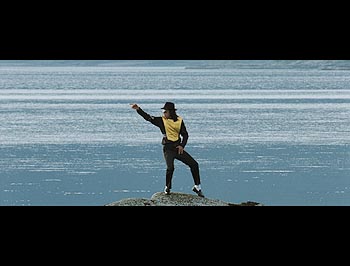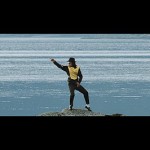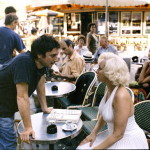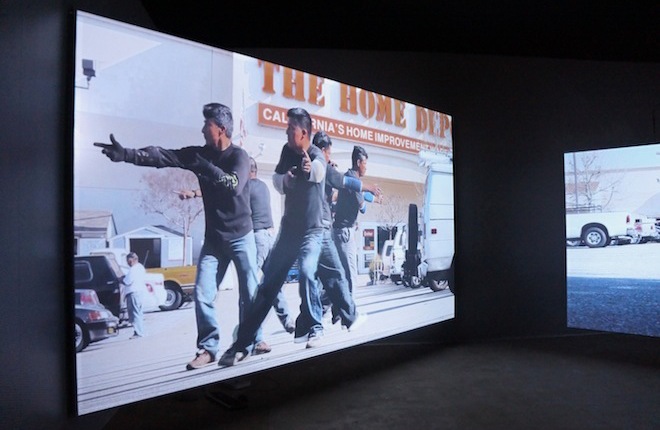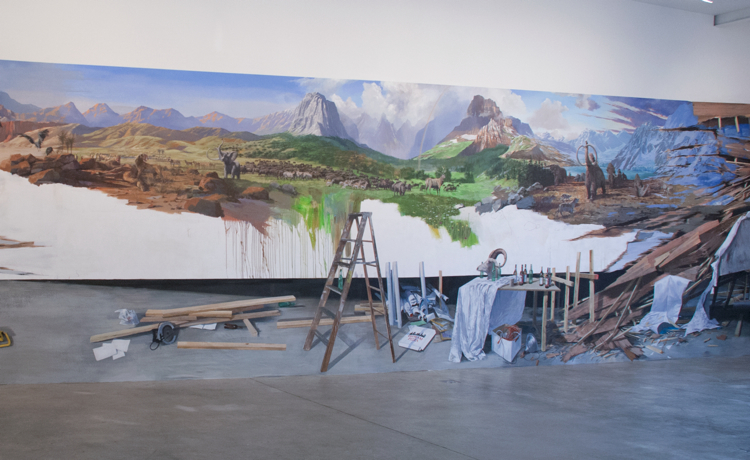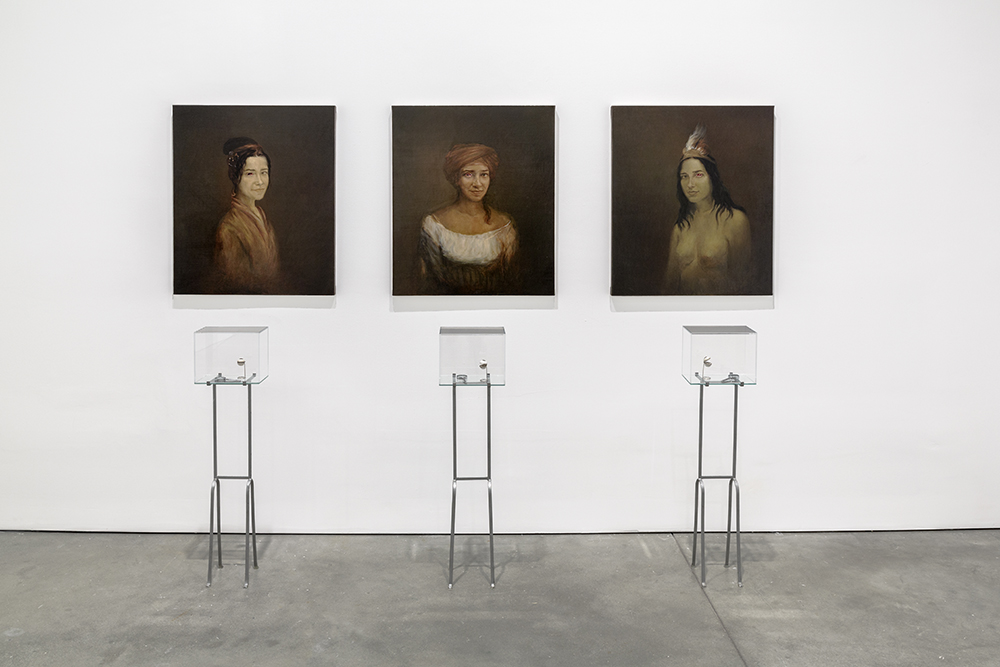By JAMES NADEAU
On April 25th I had the opportunity to sit down with the film director Harmony Korine. He was in town for the screening of his new film Mister Lonely at the Independent Film Festival of Boston. I met with Harmony in the restaurant of the Nine Zero hotel on Tremont Street. Mister Lonely is a bit of a departure from Korine's previous films in that it is a fairly straightforward story. It is the combination of two narratives. One tells the story of a Michael Jackson impersonator living in Paris. He comes across a Marilyn Monroe impersonator who invites him to a commune run by a Charlie Chaplin impersonator in the highlands of Scotland. It is a quiet tale of a group of dreamers who live as their characters, never breaking role, as they build a theatre where they can entertain the locals. This story is juxtaposed with a tale of Catholic nuns living in a poor village in Latin America who realize that they can fly as long as they are praying. The film is mesmerizing visually and heartbreaking in its quiet tragedy. As always with Korine's films, it contains some difficult scenes but it thankfully avoids what I have felt to be the gratuitousness of his previous two films Gummo and Julien Donkey-Boy. It really is a wonderful film and we had a great conversation that ran the gamut from Dogma 95 to Altman and fashion.
James Nadeau: Is the story somewhat about hubris? The dangers in trying to attain greatness?
Harmony Korine: I don't think it's about that, I mean, maybe a little bit. I don't really explain it too much just because if I could explain it in words I wouldn't film it. I usually make it because I can't talk it away. And also I don't want it to necessarily negate what you saw in it. What I would say though is that I wanted to make a movie about these characters who wanted transcendence, wanted to be other than who they are, who wanted to be greater. I have always been attracted to marginalized characters, outcasts, you know, tramps. People living outside the system, dreamers. People who create their own language, their own sense of society, their own rules and the inherent drama in those people. There is an awkwardness and a strangeness that I've always been attracted to. I thought that with the Nun story and the other story, that the two narratives kind of danced with each other.
JN: So when intertwining these two narratives, from an editorial perspective, do you identify key moments where "this would be a good time to jump?" or do you do this during the writing process, looking at it linearly and then think about what would be a good way to weave them together? Because when the jump first happens I tried to place the two stories together. I thought perhaps we had entered a dream space or gone into memory and we were perhaps seeing Michael Jackson's past.
HK: Well, I guess the script and the final product are usually, at least with my movies, two different things. I write a script and maybe sometimes a script is slightly more narrative, slightly more... it's like a starting off point, it's something that is slightly more spelled out, maybe, but never perfect. I usually just write a script once and then say "that's enough" because I am never searching for perfection or I never feel that anything is completed. The script is just to benefit the shoot. And so, then when I shoot I usually work more with my intuition. If it feels correct, then I take it in that direction.
JN: So it is much more of an organic process.
HK: It's organic, or it's musical, or whatever you want to call it.
JN: Did you have to re-think the way in which you engaged with the actors, especially in light of your earlier films, which were cast with unknowns? Here you are working with significant professional actors.
HK: Well, I still pretty much work the same way. It's more like an experiment, I like setting up an environment where anything is kind of possible. Where, hopefully, you encourage the actors to take it in some other direction, to expand upon it. In shooting I'm always working through things. I'm always figuring it out for myself. You know, I don't storyboard. I get off on the mistakes, on the awkwardness, on making the moments happen when I'm there. That is what is exciting to me about directing. So, that is always the approach. You have the script. The script is written. It's words, its dead ink on a piece of paper that I have in front of me. And that is what I am interested in.
JN: So it just explodes in the moment as opposed to...
HK: Yeah, I used to call it a mistake as art form. Where it was like putting different chemicals into a bottle, shaking it up and documenting the explosion. You know, I whisper something into this actor's ear, I whisper something different in that actor's ear. I give someone this script. I'll give out six different scripts with six different endings. Just to see, I just like to see what happens.
JN: There is a certain amount of volatility that occurs when you do this.
HK: Exactly, there is a nice chaos sometimes.
JN: How did the actors react? I would think from an acting perspective, I could see people feeding off of that or being really irritated.
HK: Yeah yeah. And a lot of times it is a combination of the two.
JN: Was there a great deal of improvisation around these moments?
HK: Improvisation is a weird word. I guess because it was improvisation in a sense that like, the characters and the actors know who they are. And then they work based off of my ideas. But not improvisation in the sense that they are just making things up. That never works. I guess, for a long time, there was an assumption that I just kind of let people just talk and do things and stuff like that but that stuff is just always awful. So, usually I'm just trying to... Sometimes I feel that if the actor is purely 100% the character then there is almost no mistakes. There's good takes and good direction and there's bad. But there's no mistakes. If you're the guy the movies about then whatever you say is correct. It might not be great but it's correct.
JN: Do you think that is much more of a mis-interpretation of the Dogma 95 aesthetic? Where people read it as this sort of off the cuff but it is much more about pushing character?
HK: Yeah. I know in my case, and in Lars' (Von Trier) and Thomas' (Vinterberg) that was always... I didn't think anybody just kind of let the actors go. Even what Lars was doing with The Idiots, I think it was pretty thought out.
JN: There was a moment when watching the film that I thought back to The Idiots. With the scene in the theatre I thought about the scene in Lars' film where they go into town and start fucking with people.
HK: Yeah, yeah. That's funny. The scene where they're spazing out. Exactly.
JN: Well, there is that moment in the film where they leave the commune and they're on the moped. It is the chaos in the fake moment. It is this interesting twist of the fake moment, with the fake people (the impersonators) in this real life setting.
HK: Yeah, yeah. Well, the movie is like the real world just slightly tweaked. That's the way all my films are... it's like a subtle science fiction. It's like the laws of science apply but then there's just kind of, maybe, a weird fuckin magic in there.
JN: Which make me think about the role that humour plays because there are so many moments in the film where people laugh out loud but it's almost this weird sort of uncomfortable laughter. Like, "how do we diffuse this moment?" Like "we're laughing at this situation but it's not really funny."
HK: I live for that. If I could just make it two hours of just that I would be happy. You know, as a kid that was the stuff I got most excited about. It was things that I laughed at but felt guilty about. I always felt that life was much more of an abstraction. I never felt one way about anything. I never felt that things were all bad or all good. Or that this were just completely funny.
JN: You set the characters up so that they enter into this dream space. You know, Marilyn Monroe leads Michael to the commune where as she says "no one dies and no one grows old. " But so you set this dream space up and then you constantly undercut it with moments of reality: the sheep die and the Pope smells bad. So there are these moments where the "real world" intrude or brush up against their fantasy.
HK: Yeah, yeah. That is kind of the theme of the movie. If there was any overriding idea, that was it. I have always been attracted to marginalized characters, people who live outside of a standard setting, people who want to invent their own reality, their own language. There is an inherent drama in those people. Because the world always comes back.
JN: I couldn't help but think about our cultural fascination with celebrities and how there is this illusion of perfect worlds. You know, once you are rich and famous you have no problems. And I kept thinking that you are demystifying the celebrity moment for people. Sure he's the Pope but ...
HK: But he smells.
JN: You know, The Journal of the Society for Cinema and Media Studies has an article on how to teach difficult films.
HK: Sure. Oh, so my movie's in there?
JN: And so they listed Gummo as "Indecipherable and difficult."
HK: (laughing) Now that's what I like to hear.
JN: And looking at this film against your other two. I feel like this film is much more straightforward. It is reminiscent of so many other films. It is like it is a mini film history. I felt like looking at these characters, who are iconic and also certainly very filmic..
HK: Well, all the films I make reflect my mental state at the time of making them so I felt very strongly about a certain kind of cinema when I started making or being able to direct films. It was like a collage. I wanted to have images coming at you from all directions. One of the things people have trouble with is the narrative, but I always felt like it was a pretty straightforward story it was just that... to me it was like I was just putting it out there. In fact, there are no answers to my films. It's not about figuring it out. It's experiential. I can't even explain it. You can't talk it away in words. It's something that should just be experienced. Like I felt touched by these moments. In cinema as in life what I remember, what kind of interested me, is specific scenes and characters, moments. And I just felt like everything else was just... all that was kind of like... forced, it was exposition. I just wanted to make a move where there was no "middle." Where it was all the top and all the bottom, like the jokes without the punch lines. I just didn't care about completing the circles. I wanted to leave a margin of the undefined. But with this movie I felt different about, not just necessarily cinema, but it was just more... I felt with this story and these characters it didn't need to be told that way. It wasn't about deconstructing. It was more about, in some ways I wanted to go back to a slightly more classical form and just go with the image. You know, just make beautiful pictures. I didn't feel like I needed to break it down or recontextualise.
JN: Well I thought about the film in the context of early Altman and McCabe and Mrs. Miller which is purely character driven. The plot comes in at certain moments but it really isn't about plot it's really about these people.
HK: Yeah, yeah, yeah. Because I have this weird thing. It is almost an aversion to plots. Like, when I am sitting there writing it's almost like my fingers won't work. My brain won't allow me to write standard plots. Because it seems like "lie" to me. You know what I mean? It just seems like a device. And even the word "Plot" makes me sick. I've never wanted to plot my life out. I never felt like things were plotted. I don't want to hang out with people who plot things. I love stories. I love characters. That's what I love. I like to hear stories. I don't necessarily... there doesn't even have to be a point to the story. I never cared about making perfect sense. I always cared about making perfect non-sense. That's what. That is it.
JN: That's the quote?
HK: That's it. I just hate the idea of being boring; of giving people what they've already seen.
JN: Last question: Do you get free clothes? Does Agnes give you free clothes?
(Agnes b, the French designer, started a production company that produced Mister Lonely among other films.)
HK: Why is that an Agnes sweater? (Laughs) Yeah, she does actually! Now that you mentioned it. She does.
JN: It's a line item in the budget?
HK: Yeah, yeah, yeah, She actually does.
JN: Well, thanks for your time.
HK: Excellent man. Thanks.
- From Mister Lonely
- Harmony Korine and Samantha Morton on the set
All images are courtesy of the artist.

